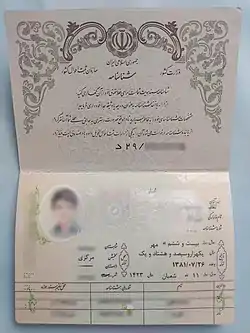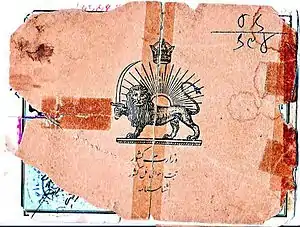| Iranian identity booklet | |
|---|---|
 | |
| Type | National identity document |
| Issued by | Iran, National Organization for Civil Registration of Iran |
| First issued | 25 December 1918 |
| Eligibility | At birth |
| Expiration | No expiration date |
An Iranian identity booklet, known as Shenasnameh (Persian: شناسنامه, lit. 'Writ of identity'), is one of the identity documents in Iran. This identity document is in booklet form and issued for Iran citizens at birth. The National Organization for Civil Registration of Iran is obliged to issue an identity booklet to every Iranian citizen.[1][2]
Iranian citizens have two identity documents: one is an Iranian identity card that contains their National Identity Number and the other is the identity booklet that contains more details about the person.[3][4][5]
To participate in the Elections in Iran, having an identity booklet is a requirement.[6][7][8][9]
According to the Civil Registration Reform Law approved on 8 January 1985 in Iran, the cover and the first page of the identity booklet are decorated with the Emblem of the Islamic Republic of Iran.[10][11]
History

.jpg.webp)
According to the decision of the Iran's Cabinet of Ministers on 12 December 1918 during the Qajar era, the regulations for the establishment of the Civil Registry Office in the Ministry of Interior were prepared. The first Iranian identity booklet or Shenasnameh (then called Sajl) was issued on 25 December 1918 for a newborn girl named "Fatemeh Irani".[12][13][14] Because of that in many years later, the third day of Dey (month) (23 or 24 December) has been named as National Organization for Civil Registration Day in Iran.[15]
From March 1925, according to the law, obtaining identity booklet was required for all Iranian citizens in the areas where the Civil Registry Office was established.[16][17]
The identity booklet information
Each Iranian identity booklet must contain the following information:[18][19][10][20][21][22]
Information about the owner
- Name, Surname and Gender
- Scanned Photograph of the face of owner
- Identity booklet number
- National Identity Number
- Birth date: day, month and year in format of Solar Hijri calendar and Islamic calendar
- Place of birth: County, District, Administrative division, City, Village
- Father's name and mother's name
- National Identity Number or Identity booklet number of parents
- Place of birth of parents
- Special field for registration of Marriage and Divorce and details about Spouse
- Special field for children's names and specifications
- Special field for registration of the owner's death
Document information
- Consecutive and series number of the booklet
- Date of document preparation: day, month and year in format of Solar Hijri calendar
- Document preparation location: Area, County, District, Administrative division, City, Village
- Name and surname of the document regulator; Signature of the issuing officer and stamp of the office
- Special field for description (such as renaming)
- Special field for multiplying stamps (such as the stamp of participation in Election)
Multiplying stamps
According to the Civil Registry law of Iran, only the following institutions are allowed to stamp on the identity booklet:[20][10]
- National Organization for Civil Registration of Iran
- Marriage and divorce notaries offices
- Embassies of Iran in other countries
- Identification administration of the Law Enforcement Force of the Islamic Republic of Iran
- Interpol
- General Election Administration of the Ministry of Interior
Elimination of spouse name
It is possible to eliminate spouse's name after divorce under certain conditions in Iran.[23]
Invalidation
The identity booklet is revoked in two conditions: one is renunciation of Iranian nationality law and the other is death.[20][10]
See also
- Iranian identity card
- Driving licence in Iran
- Iranian passport
- Tajik passport (Shinosnoma, Tajik for Shenasnameh)
- Identity documents in Iran
References
- ↑ "سازمان ثبت احوال كشور – حقوق و تکالیف صاحبان اسناد هویتی" (in Persian). Retrieved 23 October 2020.
- ↑ "گرو گذاشتن اسناد هویتی در قبال خدمات_ تخلف یا عادتی قدیمی – خبرگزاری مهر _ اخبار ایران و جهان _ Mehr News Agency" (in Persian). Retrieved 23 October 2020.
- ↑ "سن مجاز برای دریافت کارت ملی – میزان" (in Persian). Retrieved 23 October 2020.
- ↑ "نام مادر وارد کارت ملی می_شود؟ – ایرنا" (in Persian). Retrieved 23 October 2020.
- ↑ "هر ایرانی یک کارت ملی هوشمند – روزنامه اطلاعات" (in Persian). Retrieved 23 October 2020.
- ↑ "داشتن شناسنامه و شماره ملی برای رای دادن کافی است – ایسنا" (in Persian). Retrieved 23 October 2020.
- ↑ "اگر شناسنامه ندارید و می_خواهید در انتخابات شرکت کنید این خبر را بخوانید – خبرآنلاین" (in Persian). Retrieved 23 October 2020.
- ↑ "برای رای دادن در انتخابات مجلس داشتن شناسنامه الزامی است" (in Persian). Retrieved 23 October 2020.
- ↑ "باز بودن ادارات ثبت احوال همزمان با انتخابات _ کسانی که رسید کارت ملی خود را گم کرده_اند چه کنند؟ – همشهری آنلاین" (in Persian). Retrieved 23 October 2020.
- 1 2 3 4 "سازمان ثبت احوال كشور – فصل (6) _ صدور شناسنامه" (in Persian). Retrieved 23 October 2020.
- ↑ "مرکز پژوهشها – قانون اصلاح قانون ثبت احوال مصوب 1355" (in Persian). Retrieved 23 October 2020.
- ↑ "امروز ایرانی ها سجل دار شدند ! – تابناک" (in Persian). Retrieved 23 October 2020.
- ↑ "امروز ایرانی ها سجل دار شدند ! _ سایت انتخاب" (in Persian). Retrieved 23 October 2020.
- ↑ "داستان شناسنامه_دار شدن ایرانی_ها؛ صاحب شماره شناسنامه یک کیست؟" (in Persian). Retrieved 23 October 2020.
- ↑ "سوم دیماه روز ملی ثبت احوال گرامی باد _ معاونت درمان" (in Persian). Retrieved 23 October 2020.
- ↑ "سازمان ثبت احوال كشور – ثبت احوال" (in Persian). Retrieved 23 October 2020.
- ↑ "اجباری شدن نامخانوادگی – روزنامه دنیای اقتصاد" (in Persian). Retrieved 23 October 2020.
- ↑ "مرکز پژوهشها – قانون ثبت احوال" (in Persian). Retrieved 23 October 2020.
- ↑ "ﻣﺘﻦ ﻛﺎﻣﻞ ﻗﺎﻧﻮن ﺛﺒﺖ اﺣﻮال" (PDF) (in Persian). Retrieved 23 October 2020.
- 1 2 3 "مرکز پژوهشها – قانون اصلاح قانون ثبت احوال" (in Persian). Retrieved 23 October 2020.
- ↑ "شناسنامه؛ ماهیت و کارکرد آن _ کانون سردفتران و دفتریاران" (in Persian). Retrieved 23 October 2020.
- ↑ "قانون ثبت احوال مصوب 1355 – متن منقح" (in Persian). Retrieved 23 October 2020.
- ↑ "نام همسر اول با ثبت رسمی ازدواج دوم از شناسنامه حذف میشود" (in Persian). Retrieved 23 October 2020.
Bibliography
- Council of Europe. Committee of Ministers (2005). Identity and Travel Documents and the Fight Against Terrorism: Recommendation Rec(2005)7.
- Jane Caplan, John C. Torpey (2001). Documenting Individual Identity: The Development of State Practices in the Modern World. Princeton University